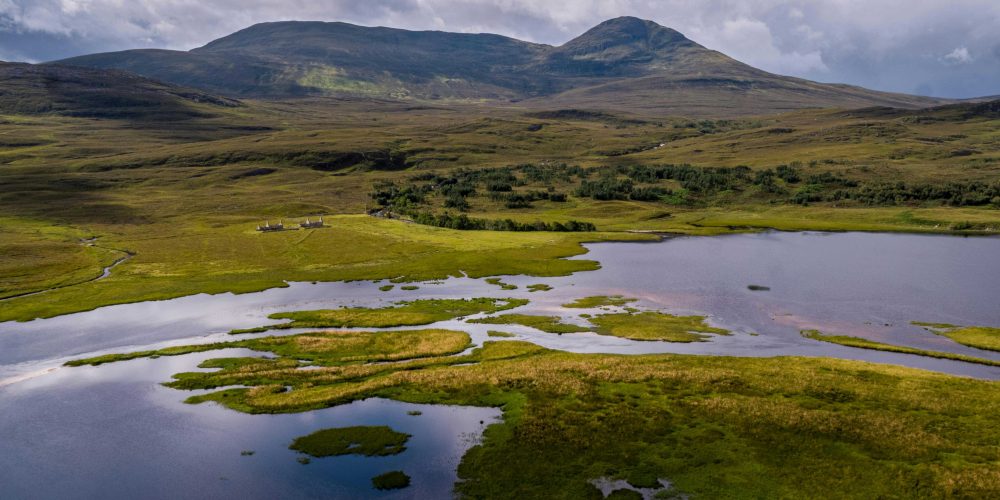
Highland destocking threatens more than sheep production, says NSA
13th June 2025
Wholesale flock removal from Highland Glens for carbon offsetting poses risks that extend beyond simply reduced lamb production and sheep sales, warns National Sheep Association (NSA).
According to an exploratory survey of 51 Highland estates by NSA, many flocks have been completely removed, for either regenerative projects or forestry creation.
“More than 50,000 breeding ewes have vanished, largely in the past decade”, says NSA Scottish Region chairman Peter Myles.
Peter said: “The figures are a stark reminder that money talks, and the rent upland sheep farming businesses can pay is insignificant compared to carbon offsetting income and cash for biodiversity net gain. It is worth noting that one flock on Skye gave up because of sea eagle predation.”
“We cannot blame the estate for wanting to diversify income and future-proof itself, it is government policy nationally and internationally that we question.”
However, Peter noted that 12 of the estates had reduced sheep numbers, but had maintained a small flock, for example dropping from 1,000 ewes to 200.
“A smaller flock can deliver ecosystem services and keep farming skills alive, while fitting around a mosaic of upland habitats. It’s important to strike a balance and running a smaller flock that can still help sequester carbon in grassland, create habitats for ground-nesting birds, produce maternal genetics, nutritious food and sustainable fibre is far better than no livestock at all.”
“Scotland’s national breeding flock contracted 3.7% last year to sit at 2.45 million. There were around 3 million breeding ewes in 1900, and one million fewer Scottish people to feed,” said Peter.
“We are left asking questions as a sheep industry. How long will this decline continue? At what point will the trends to put sheep off and reduce flock numbers cease?”
Eleanor Kay, Senior Policy Adviser (Agriculture & Climate Change) at Scottish Land & Estates, says: “Expectations of Scotland’s land have changed dramatically over the past decade, with demands for food production, nature restoration and carbon sequestration all rising – alongside the need to support rural jobs and communities.
"We strongly back the livestock sector, but these findings reinforce the need for clarity and long-term certainty from government when it comes to agricultural support. Right now, the risk is too high for many farming businesses to invest or even stay afloat.
“Carbon accounting must also reflect the realities of livestock systems. We have continuously called for improvements in this area, a shift in accounting to recognise methane’s shorter lifespan compared to fossil fuels would offer a more accurate and balanced approach – and play a crucial role in securing the future of sustainable livestock farming in Scotland.” Eleanor concludes.
NSA is concerned about several key issues beyond the direct threats to breeding sheep sales and sheep meat output caused by sector contraction. One major concern is the loss of rural skills, such as working and training sheep dogs, hefting, and understanding extensive landscapes, which are difficult to revive once inherited skills disappear as they are not taught through the education system. There is also a threat to critical mass, as falling livestock numbers endanger businesses that rely on throughputs, including auction marts, abattoirs, and related businesses in animal health and nutrition. Furthermore, unmanaged hill ground can become overgrown if ungrazed, posing a threat to ground-nesting birds and native wildflowers. This accumulation of ungrazed dry matter also increases wildfire risk, creating a tinderbox that threatens residents and wildlife. Rising tick populations are another concern, as they are increasing in many areas without ectoparasite control as part of the usual flock health plans.
The NSA also highlights the issue of misleading carbon accountancy, advocating for methodologies like Global Warming Potential (GWP) that treat methane and greenhouse gases from fossil fuels differently, which would be more realistic and benefit ruminant agriculture. The loss of the farming ecosystem is a concern, as the natural grazing and dunging processes of ruminants are crucial for soil health, building organic matter, and sequestering carbon, with sheep also providing food and nesting material for various species. Lastly, there are diminishing opportunities for new entrants, as disappearing farms reduce chances for young farmers to enter the profession, though upland sheep systems offer a suitable low-fixed cost base and cashflow for new businesses. This contributes to the overall loss of rural communities, where farming acts as the heartbeat and sheep farmers serve as custodians of Highland tradition.

